Google released real-time search this week, incorporating Twitter and kin. So we at Greenlight took it for a road test. We evaluated what the pros and cons are for users and for marketers. Amidst all the hype, I can't help feeling the usefulness of the results seems to range from the inconsequential, to the surreally disappointing.
Admittedly these are early days, but in our first road tests, which happened to be on searches for 'Turkey' i.e. the country not the game fare, the impressive list of relevant results, which included Lonely Planet, The State Department, The CIA, The Turkish Tourism Ministry, had somehow been permeated by the resounding news, that 'thoughtbeast' (presumably an alias), was enjoying a sliced turkey sandwich for lunch. With milk and Doritos, no less!

Ok, fair enough. Seasonally relevant perhaps, but way off the mark. Having been in search marketing for 10 years, and seen all the Q&A that goes into search results to ensure they aren't ravaged by nonsense, I am forced to ask just how far we have come, if 'thoughtbeast' and his late lunch can pip the CIA for a page 1 spot on a one word search term of complete parallel. Already sceptical, we are now immediately unimpressed.
Other searches produced similarly mundane and useless results, this time in the brand space of certain large household names.
A search for 'Tesco' and 'Asda', (for me at least) revealed little else, other than how useless and trivial the social sphere can be sometimes, and just how undeserving some of this stuff is, of inclusion in search results. So initially for me, it's just not groundbreaking.
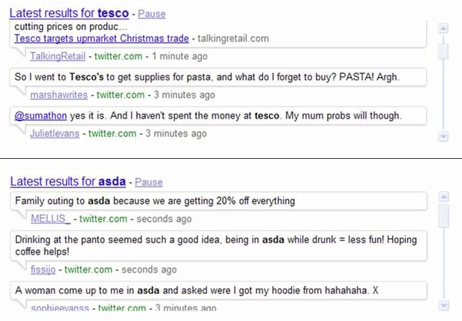
The majority of these inclusions are either just trivial pieces of inconsequential chat, or they are citations of the sort of information that is already available on the Google news results window that has been there for some time now.
Take the very moment of 'Tiger woods' (see below). The news results do their job. They are well placed at the top of the page given the current relevancy of the topic. Then more news content, plus a little bit of useless social chit chat.
At which point we're forced to ask just what value it actually adds. Why not make the Google News insertion real-time if that's what you want to do?

Fools/under pressure public companies, rush in
Given Google's efforts to organise the worlds information, this live deluge of yet more news, interspersed with random transient chit chat feels very un-Google. It is more like a knee jerk first attempt to get something live to compete with Bing who for once, (enjoy it while it lasts folks), has got the jump on Google, in getting real-time search in there first. Arguably, Bing's done it in a more relevant context too.
There is still much debate as to whether social comments like this are worthy content or just references to them. Bing's approach to listing the most socially cited links seems far more useful when compared to Google's. Google's feels more like those times when you would pick up the phone and suddenly end up with a crossed line, and find yourself sitting there listening to two randoms having a natter about something.
If you really want to present an overview of the information available in the social sphere, there are better ways to do it than this. A 'tag cloud' might do a better job. Consider Greenlight's mock up (below), of the continuing 'Tiger woods' story which we have created based on keyword analysis of Twitter results. A 'tag cloud' could organise the myriad of chat and disparate nuggets of information telling person searching what the key trending topics are in the social sphere, and allowing them to navigate to an aggregated and specific view of the collective tweets relevant to the tag.
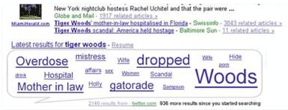
In my view, search has become too obsessed with presenting everything in one multimedia interface. Whilst this is a fairly noble pursuit, users are not overtly concerned with having to make their way to information as long as they get what they want. A more useful approach is definitely required. For the non-tech savvy, 'Tag clouds' are not perfect, but even a simple list of popular sub-topics would make this more useful.
No doubt this isn't it for real-time search. It'll be improved on. However, the bigger issue for real-time search is what search engines do with it. Tweets on the whole are generally either citations of other content, messages, or publicly aired views, so real-time data isn't always useful to present, although there's no doubt it's a very effective barometer for what's of the moment.
Search engines need to better work out when they need to use real-time data to create better results, and when real-time data, actually is better results. It isn't all one and the same.
Implications for marketers and search marketers
The validity or quality of real-time content aside, what this is doing is adding yet another window of 3rd party content into an already crowded search engine results pages(SERP), pushing down some natural results, and creating another opportunity for visibility and/or detraction by third parties.
The big issues are:
- Where is this likely to appear in keyword terms?
- How does it affect the control we have, or want to have over those spaces?
In our daily rank checks at Greenlight, we monitor hundreds of thousands of keywords. We identified real-time results in less than 0.5% of them, and most of these were brand oriented keywords.
This leads us to conclude that for the time being, and as with most 'universal search' elements, this is more likely to pop up in your brand space, rather than in generic terms.
In other words, a brand like Tesco is more likely to see this popping up in searches for 'Tesco', than it is in a search for 'Samsung 32 inch lcd'. This means that the impact on most generic and product-led search activity will be minimal, unless they suddenly gain significant and concentrated social attention.
The bigger issue is reputational, since there's now a real-time window in your branded search space for people chatting about you however glowingly, controversially or mundanely that might be. This creates further reputational issues in your branded search strategy.
Opportunities
The right fostering of the social community in things you do in real-time, can make their way into search far faster than they would have done historically. For example, you have a special offer, running a sale or promotion. These can now work their way into search results. As such, there is definitely a positive angle for this integration if it makes its way into your brand space.
What is interesting is whether this may actually have an impact on branded terms that are part of your paid search strategy. Pay per click (PPC) was previously the traditional route for rapid response or timely tactical promos. If the social sphere gets wind of your latest promotion, then it's quite possible that natural real-time results could end up winning more brand traffic share, which in turn could lighten the pressure on branded spend, and act as a more compelling click area than the many competitors trying to hijack traffic in your branded search space. Worth noting is that if this happens, it will make full click path conversion tracking absolutely crucial, as it may appear that your branded clicks and conversions from paid search are declining.
Threats
The bigger issue is that there is now yet another window for less than favourable conversation and discussion, to make its way in to your branded search space. Of course this isn't a new thing. Universal Search has been active for some time now. Images, video, news, even blog posts, as well as traditional listings, are all well known loose cannons that need to be continually watched and tied down.
What this does is add one more, and underscores a long lamented need to develop a strategy to tie down your branded search space, and stay vigilant for any incursions into it. Some brands already do this quite well and will likely find themselves fairly well insulated. If you consider Vodafone below, there is good control of the branded space already, and so there is less of an opportunity for uncontrolled universal elements like real-time search, to make its way in.
If you consider a brand like KFC below, the brand page is littered with detractors in all forms and formats. For a brand with this kind of representation, real-time search is yet another can of worms to add to this, as an already open brand space filled with detraction can only get worse.
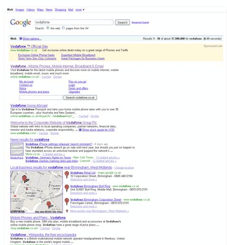
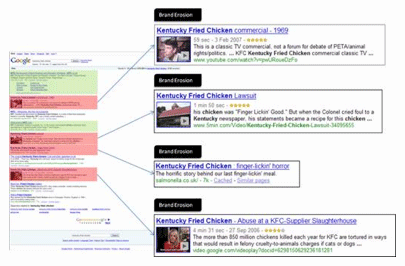
What else could Google do with real-time integration?
What's clear is that real-time isn't going anywhere. But the integrations thus far, are not really doing it justice.
As a final point, we thought we might as well go blue sky with a few ideas that might make good real-time integrations.
Key listing integration: If you have a twitter account that is associated with your company, you could opt to have its feed included in your key brand listing. This would be an enormous boon for brands who could then use the brands coverage in natural search as a real-time tactical marketing tool
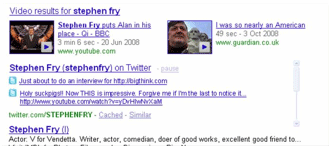
- Twitter listing integration: If you're going to list a twitter page in search results, then a feed of the data in the result would do its listing more justice, than simply the biog line. Again, if a brand's Twitter account can show in its branded search space, brands have a real-time voice in to natural search results, enabling them to deliver real-time messaging to their customers, and help combat any detractive comment.
- Real-time categories: Real-time data is disparate, and a 6 line scrolling feed of random 'as it comes' chat, is far from ideal as an interface. Categorising the noise into determinable topics of possible interest alerts individuals to the real-time aspect of what they are looking for, allowing them to further investigate the item that's most relevant to them.
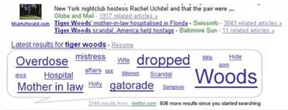
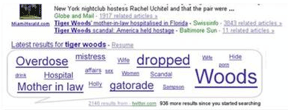
Perhaps the ideas expressed above are already in the pipeline. If not, they would most certainly add more value to both users and marketers alike, and provide for far more credible and useful real-time search capabilities compared to what is currently available.
Again it's still early days. As such, the mantra for now is still the same as it ever was for marketers, defend the hill, and keep watch. If you don't have a media monitoring strategy and action plan in place, it's time to get one, because social media integrations in search can now give quite a bite.


